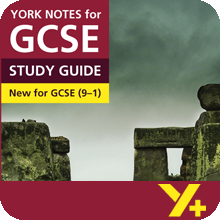Examiner's Notes
You assessed this answer as Grade 6.
Hover over the highlighted text to read the examiner’s comments.
Question: Read from Act I Scene 5 ‘My dearest love, Duncan comes here tonight ...’ (line 45) to ‘Leave all the rest to me’ (line 60). In this scene, Lady Macbeth is discussing her plans for the king.
Starting with this conversation, explore how far Lady Macbeth is presented as the main villain of the play.
Write about:
- how Shakespeare presents Lady Macbeth in this extract
- how far Shakespeare presents Lady Macbeth as the main villain in the play as a whole.
In Act I Scene 5 we are presented with a villainous Lady Macbeth plotting the murder of King Duncan. She is presented as the evil driving force in the lead-up to the king’s murder though this idea is not sustained and later we witness the character softening and eventually descending into madness.
In this conversation Macbeth is presented as a doting husband, using the term ‘My dearest love’ to address his wife. She is quick to ask when Duncan will leave Dunsinane and becomes excited when she proclaims her intention ‘never/Shall sun that morrow see!’ The exclamation mark at the end of this line shows her enthusiasm for the plan to murder the king; a clear example of Lady Macbeth as villain.
She then proceeds to advise Macbeth on how best to present himself. She accuses him of being too easy to read and says he must ‘look like the innocent flower,/But be the serpent under’t.’ This shows us that she is deceitful and that the audience sees her as a scheming Machiavellian character.
Her evil is further demonstrated by the way she gives directions to Macbeth. In ‘you shall put/This night’s great business into my dispatch’ the pronoun ‘my’ shows that she, not Macbeth, is responsible for this murderous plan.
In fact, Macbeth appears to desire that the plan is delayed. He says ‘We will speak further’ suggesting that he is not entirely in agreement with Lady Macbeth at this point.
Later in Act I, we see additional evidence of Lady Macbeth as villain. When Macbeth says he will ‘proceed no further in this business’ she uses her powers of persuasion – undermining his manliness and questioning his courage – to convince Macbeth that murder is the best course of action. It is Lady Macbeth who suggests duping the guards ‘with wine and wassail’, and she who takes the bloody daggers from Macbeth to plant them on the grooms. She shows no fear of the dead, claiming the ‘sleeping and the dead/Are but as pictures’.
A contemporary audience may have been challenged by this intimidating female character. At the time when the play was written, women were largely treated as the property of their husbands or fathers, so Lady Macbeth is unusual in her outspoken manner, and also in her power. Macbeth says she should ‘bring forth men-children only!’ suggesting that her strength is more suited to warriors and kings.
Later in the play her character changes and by Act III Scene 2 we begin to see signs of her regret. When she says ‘naught’s had, all’s spent’ we are presented with a character whose excitement is waning with the disappointment of the outcome. Her language when speaking with Macbeth is less aggressive and more soothing. She says ‘Gentle my lord’ and whereas in earlier scenes she dominated the dialogue, her lines are fewer in this scene.
In Act III Scene 4 when the ghost of Banquo haunts Macbeth at the feast, Lady Macbeth plays the peacemaker, attempting to calm the ‘good peers’. Macbeth echoes her earlier challenge about being a man with ‘What man dare, I dare’. The repetition of ‘dare’ emphasises his determination and sheer determination and we see that he has now overtaken his wife in the role of the play’s main villain.
The next time Lady Macbeth appears is when the doctor has been summoned to witness her strange nightly wanderings. In Act V Scene 1 we see, not a villain, but a woman reduced to sickness by guilt. Eventually she kills herself, not the act of a villain, but more of a coward, unable to face the consequences of her actions.
Overall, Lady Macbeth can be seen as a villain, and she is certainly portrayed as such in the earlier scenes, especially where she is plotting with her husband as in the extract. However, when Macbeth arranges for Banquo’s murder without consulting her, he takes the lead as the main villain in the play and acts increasingly alone during his violent and brutal reign.
